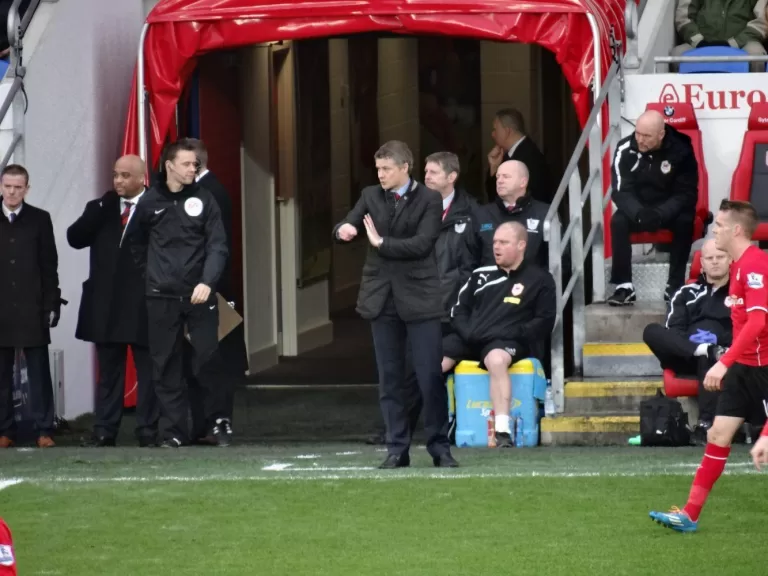Over the past few months, Ole Gunnar Solskjær has been credited with “bringing the smiles back” to Manchester United…
After Manchester United’s loss to Liverpool, United fell 11 points behind the top-four. More than the loss, it was the manner in which they lost that was worrying. The team was in total disarray, which resulted in José Mourinho being sacked. To everyone’s surprise, Ole Gunnar Solskjær was announced as interim manager till the end of the season.
Having only managed Cardiff City before this – and seen them relegated from the Premier League – Solskjær had a big job on his hands. Perhaps the only advantage he had was being someone from within the club; someone who knew what it meant to be a United player. Fast-forward to now and Manchester United sit two points behind 4th, having racked up an 11-match unbeaten streak before losing to Unai Emery’s Arsenal.
https://twitter.com/Squawka/status/1099652664084844544
Terms like ‘new manager bounce’ have been thrown Ole’s way, but the team’s progress has been way too drastic for it to be classified as such. There’s a lot of substance behind everything Solskjær’s achieved thus far. Let’s look at the key aspects of his management:
Man-management
A key part of the Norweigan’s approach has to be his man-management. Under the previous regime, most of the players weren’t performing to their full potential. Solskjær has come in and made the same players feel comfortable expressing themselves. Instead of tailoring their style according to the opposition, Ole has moulded it around Manchester United’s own identity.
Nine of Romelu Lukaku's 14 goals for Man Utd this season have come away from home.
Ole's at the wheel; Lukaku scoring on the road. 🚗 https://t.co/L2pwybfSQj
— Squawka Football (@Squawka) March 6, 2019
As a result, multiple players have improved drastically. This surge isn’t limited to attacking options either as defenders like Lindelöf and Shaw are playing some of their best football at United. Pogba had arrived in 2016 to become the club’s poster-boy and lead them to glory – but was failing to live up to the hype. The Frenchman looked to be on his way out of the club.
Solskjær has the midfielder’s head screwed on right and his performances have been pivotal to the team’s revival. Pogba has been almost unrecognizable, boasting his best season statistically. Ole was named “The Baby-faced Assassin” due to the ruthless streak he hid behind his innocent face – and rumour has it that acting on his reputation has proven useful when commanding respect from his players.
15 – Paul Pogba has been directly involved in 15 goals in 12 games in all competitions under Ole Gunnar Solskjaer (9 goals, 6 assists), six more than he managed in 20 games under Jose Mourinho this season (5 goals, 4 assists). Ruthless. #CHEMUN pic.twitter.com/BloJh38TpD
— OptaJoe (@OptaJoe) February 18, 2019
Style-of-play
Ole’s style is very much similar to modern managers. He wants his team to press high up the field and counter from there. Flexibility in attacking positions and flooding the box when moving forward have been key aspects of his reign so far. Solskjær usually implements a 4-3-3 system, with the full-backs marauding down the flank and the defensive midfielder tucking in between the defence. As the width comes from the full-backs, the front-three play closer together and interchange positions.
The most impressive part of Ole’s tactics has been his ability to adapt to the circumstances without sacrificing the side’s attacking instincts. Against some of the bigger teams, he’s adopted a midfield diamond to crowd the middle of the park and played two strikers to break at speed. This was evident in the win over Tottenham Hotspur, as the duo of Rashford and Martial wreaked havoc.
🇳🇴 Ole Gunnar Solskjaer’s record as @ManUtd manager in the @PremierLeague:
🏟 10 Games
✅ 8 Wins
🤝 2 Draws
❌ 0 Defeats⚽ 26 Goals Scored
🥅 6 Goals Conceded
🧤 6 Clean Sheets✅ First PL manager to record 25 points from their first 10 games.
🎶 'Ole's at the wheel…' pic.twitter.com/qf75Pju1QP
— SPORF (@Sporf) February 24, 2019
More to come
The past three months have been nothing short of a dream for Solskjær. He’s answered every question asked of him. Winning at Chelsea immediately after a home defeat to PSG in the Champions League has arguably been his greatest triumph. After all, a team isn’t judged on its victories but on how it reacts to adversity.
So far, Manchester United have coped well with the challenges they’ve faced. There’s still much left to play for in the season as United are in the FA Cup and Champions League quarter-finals – while remaining within touching distance of the top-four. If Ole Gunnar Solskjær carries on like this, there’s no reason he shouldn’t be handed the permanent job.
